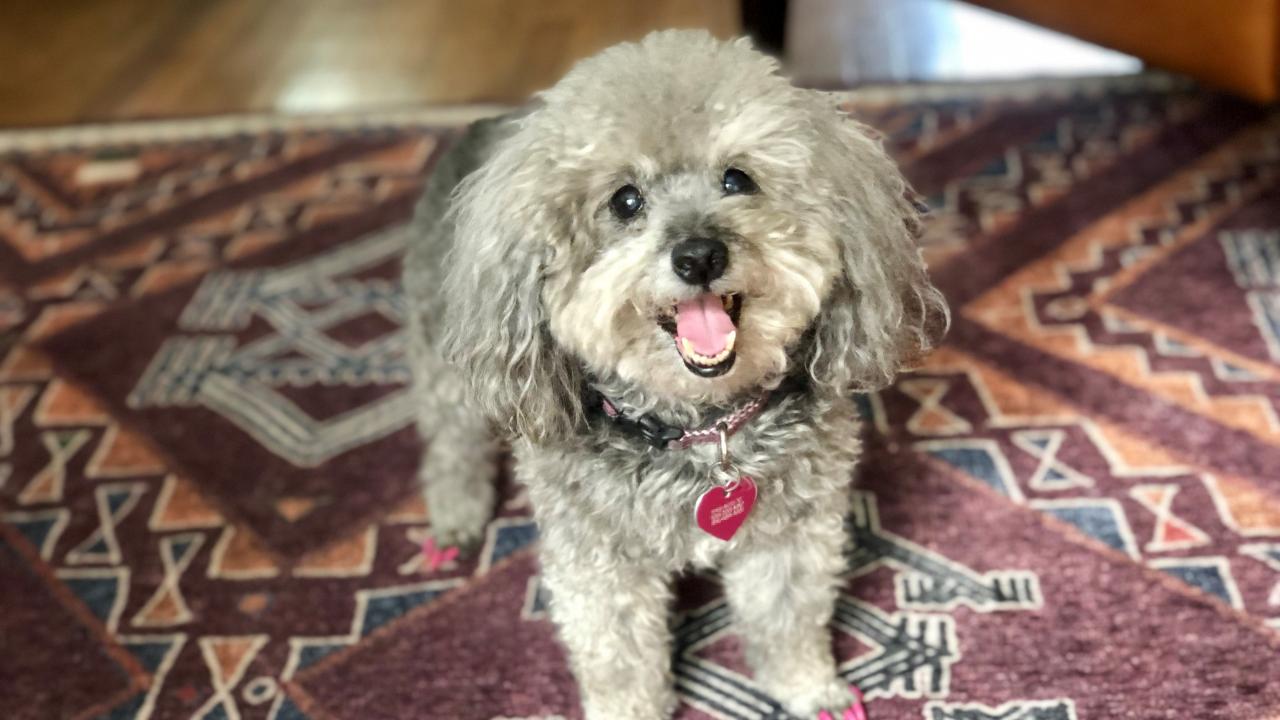
Poodle Conquers Three-Year Battle with Disease
“Case of the Month” – October 2019
Penny, a 7-year-old female poodle mix, first came to the UC Davis veterinary hospital in 2016. Through more than 100 visits to the hospital over the past three years, pet parents Amanda Frew and Amanda Brown have helped Penny battle immune mediated thrombocytopenia – a condition that caused Penny’s immune system to attack and destroy her own blood platelets. Without platelets, Penny’s blood would be unable to clot properly, putting her at risk of bleeding to death with even minor injuries.
Most cases of this disease respond well to immunosuppression alone, sometimes with only a single medication or occasionally needing more than one. When Penny initially presented to UC Davis, she was on three different medications. Drs. Krystle Reagan and Laura Lim, residents with the Internal Medicine Service, initially tried a specific kind of immunosuppressant agent from human blood that helps slow down an overzealous immune system and has been shown to help some dogs with immune mediated thrombocytopenia. Penny responded well initially, but unfortunately relapsed.
Because the spleen is where much platelet destruction occurs in dogs with immune mediated thrombocytopenia, Penny’s spleen was removed, and she began to respond well and had her medications tapered. However, Penny continued to respond and relapse to medications two more times throughout 2018. A relapse at the beginning of 2019 became much more complicated.
By this time, Drs. Lim and Reagan completed their residencies (a three-year advanced training program to become a specialist), and resident Dr. Craig Sutter joined Penny’s care team. She was switched from prednisone to cyclosporine, and the veterinarians started a new full diagnostic work-up to continue to evaluate for Penny’s elusive underlying cause.
When an abdominal ultrasound was repeated, the team found a large blood clot in one of the main veins leading to her liver. This blood clot was likely formed from some combination of the two medications she was on for her disease. Most times, patients in this condition are administered anti-clotting medications, but Penny was too high risk for this, as the main side effect of anti-clotting medications is bleeding. If Penny started to bleed, she would not be able to stop.
Penny’s immunosuppressive medications were switched in an effort to better control her disease and improve her platelet count. However, she began to bleed into her gastrointestinal tract from her underlying disease and became severely ill. While Drs. Reagan and Sutter contemplated discussing quality of life with Frew and Brown, Penny continued to fight.
“Never at any point did it appear that her spirit diminished,” said Frew. “We couldn’t give up on her because she was never going to give up on herself.”
She responded well while hospitalized and although her platelets didn’t increase, she stopped bleeding. The team switched her immunosuppressive medications once again to a combination of drugs they had never used before in an effort to control her particular disease. This last combination finally turned out to be what Penny needed. Her platelets improved to the highest levels in years, increasing to a normal level where she could start on an anti-clotting medication to break down the massive clot discovered on the ultrasound. At a recent appointment, Penny’s care team reported that only a small fragment of the clot remains.
“Penny has suffered rare but severe complications from her multiple immunosuppressive medications – complications that would cause most animals to pass,” Dr. Sutter said. “Both Dr. Reagan and I would have given Penny a poor prognosis not even two months ago, and now she is doing so well and continues to have normal platelet levels.”
“All the doctors, students and especially the techs—we know the techs better than anyone—have all been fantastic,” said Frew. “It’s great that the whole team knows Penny so well. Every time we came, everyone in the hallway stopped and said hello to Penny.”
Throughout Penny’s years of treatments, she had to receive multiple blood transfusions. Thankfully, the UC Davis veterinary hospital runs the largest veterinary blood bank on the West Coast. Every year, hundreds of dogs from the community donate more than 600 pints of blood. One dog’s donations can help up to five dogs like Penny who are hospitalized at UC Davis.
“I don’t know that any other place in the world could’ve been able to handle this case,” continued Frew, discussing the complexity of Penny’s disease. “This was a very complicated case with a lot of complicated terminology, so it was really nice to have doctors explain things in a way we could understand. They were so thorough in their work-ups of Penny’s case. They thought of every potential scenario and every possible way to treat it.”
“This was a case unlike any I’ve seen,” said Dr. Sutter. “I felt like we had to try everything for Penny.”
“You can tell that everyone there is equally as apt at their job as you could hope for,” Frew said. “The level of competency is unmatched.”
Across the board—from the veterinary team, to the owners, to Penny herself—a dedicated, never-give-up effort over three years gave a little dog her life back.
“Now she is more energetic and vibrant than ever,” said Frew. “She’s a happy, healthy little girl again.”
# # #
